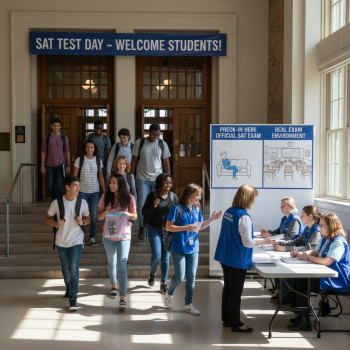Should You Retake the SAT Before Applying? — A Practical Conversation
Take a breath. The decision to retake the Digital SAT is one of those high-stress crossroads that feels bigger than it really is — especially at 3 a.m. while filling out college lists. The truth: this choice is personal, practical, and absolutely manageable. Whether you’re the student trying to make the best use of time or the parent who wants to help without overstepping, this guide walks you through the questions that matter, the timelines to watch, and clear next steps so you can decide confidently.

What “retake” really means today — quick facts
First, a few practical facts to anchor the conversation: you can take the Digital SAT more than once. Many students do, and many colleges will consider your highest scores — or will superscore by combining your best section scores across test dates. But rules and timelines vary by school and scholarship, so the decision isn’t only about “can” you retake — it’s about “should” you retake.
Key considerations at a glance
- How close is your score to your target or to the middle 50% of your dream schools?
- Do you have time to prepare and sit for another test before application deadlines or scholarship deadlines?
- Did you identify specific, fixable weaknesses from your last test?
- Will a higher score materially improve your admissions chances or scholarship eligibility?
- How will an extra test attempt affect your stress and senior-year workload?
Step-by-step: How to decide whether to retake
Let’s turn those considerations into a short decision flow you can actually use.
1. Set (or confirm) a target score
Begin by researching the test score ranges for the colleges on your list — look at the middle 50% range for admitted students and note where you fall. If you’re comfortably within or above those ranges, retaking may be less urgent. If you’re below or near the low end, a targeted retake could help.
2. Compare likely impact: admissions vs. scholarships
Remember that for many schools admissions is holistic: SAT is one piece among GPA, coursework, essays, activities, and recommendations. But for merit scholarships, a few tens of points can matter a lot. Ask:
- Does a higher SAT score open scholarship opportunities?
- Would it change my admissions category at my top-choice schools (e.g., move me from borderline to solid)?
3. Read your score report like a detective
An honest self-review is golden. Look for patterns: was timing a problem? Did a particular question type or domain drag your score down? If your weaknesses are specific and solvable — vocabulary in context, algebra fluency, or evidence-based reading — a focused study plan can move the needle.
4. Evaluate the timeline
Check application deadlines (early action/early decision vs regular) and scholarship deadlines. If a retake fits into a window that allows you at least 6–8 weeks of meaningful prep and a buffer for score reporting, it’s a candidate. If the next test date leaves you rushed or burned out, weigh whether a trained, intensive two-week prep would realistically help — not just hope it will.
5. Decide based on realistic improvement
Not all students see big jumps, but many do improve by 20–80 points with targeted prep; some see more. If your practice and diagnostic tests after a short study cycle show upward trends, retake. If practice is stagnant, step back and change strategy — different materials, a different tutor, or more time.
How much can a typical retake help? Real-world examples
Numbers tell stories, but context matters. Here are a few simplified examples that capture real-world patterns:
- Example A — The focused jumper: Riley scored a 1150, identified timing issues and algebra mistakes, spent 8 weeks on a targeted plan, and improved to 1230. That 80-point jump unlocked a merit scholarship at a target state school.
- Example B — The steady climber: Jordan scored 1310, practiced steadily, and saw incremental growth to 1360 over two retakes. The improvement didn’t change admission results but reduced anxiety and gave a confidence boost.
- Example C — The content fixer: Priya scored 1020 and discovered major gaps in reading strategies and basic algebra. After a longer prep cycle and 1-on-1 tutoring, she rose to 1170 and was invited to apply for scholarships at a few colleges she’d previously thought out of reach.
Preparing to retake: a practical study plan
If you choose to retake, preparation beats hope every time. Below is a simple, realistic plan you can adapt based on how much time you have.
Eight-week focused plan (if you have time)
- Weeks 1–2: Diagnostic + fundamentals. Take one full-length official practice test to identify weak areas. Build a short list of the top 3 skills to improve.
- Weeks 3–5: Targeted practice. Use daily mini-sessions for problem types that challenge you. Mix in timed section practice once per week.
- Weeks 6–7: Full-timed tests and review. Take two full-length tests under test conditions; review every missed question, not just categories.
- Week 8: Taper and strategy. Light practice, sleep routine, walk-through of test day logistics, and mental prep.
Four-week accelerated plan (if time is tight)
- Week 1: Full practice test + intense review of top two weak areas.
- Week 2: Daily focused drills + one timed section practice every other day.
- Week 3: One full-length practice test and corrective study on recurring errors.
- Week 4: Light practice, rest, and logistics rehearsal.
Who can help?
Some students thrive with self-study tools and official practice exams. Others benefit from a short burst of 1-on-1 tutoring to correct habits and accelerate improvement. Personalized tutoring (like Sparkl’s 1-on-1 guidance) can be especially valuable when time is limited: an expert tutor spots patterns faster, builds a tailored study plan, and offers targeted practice that avoids wasted effort.
Table: Quick decision checklist
| Question | If Yes | If No |
|---|---|---|
| Is your score below your target by 30+ points? | Retake likely helpful — prepare with targeted plan. | Retake less urgent — consider application strategy. |
| Do scholarships you want require a higher score? | Retake — potential financial benefit. | Less pressure to retake for money reasons. |
| Do you have 6–8 weeks for meaningful prep before deadlines? | Yes — effective prep possible. | No — consider a later date or submit current score if satisfactory. |
| Did your practice tests show improvement after short study? | Retake — trend suggests growth. | Re-evaluate study approach first; don’t retake blindly. |
Test-day and score-sending strategy
Once you retake, decide which scores to send. Many students send only their highest score, while many colleges superscore and will automatically consider section-best scores across dates. Check each college’s policy if you’re unsure. For fee-waiver eligible students, using fee waivers wisely (they can cover multiple test-related services) reduces cost barriers to trying again.
Timing tip for seniors
If you’re applying early (ED/EA), your application deadlines are earlier — so plan retakes well before those dates. If you miss an early deadline, a fall retake might still work for regular decision. Always leave buffer time for score reporting.
Mental game and managing stress
Retaking the SAT is as much emotional as it is academic. A few pointers to keep pressure healthy:
- Frame the retake as an experiment: try a strategy, measure the results, iterate.
- Schedule study in short, consistent blocks; avoid all-night marathons that lead to burnout.
- Keep perspective: your transcript, essays, and recommendations often carry more weight than any single test date.
- Celebrate incremental gains — steady improvement matters.
When NOT to retake
Sometimes the smart choice is to stop. Consider not retaking if:
- Your score is already above the target range for most schools on your list.
- Practice under timed conditions shows no upward trend despite effort.
- Retaking would conflict with critical activities (senior year classes, major projects, health) and add harmful stress.
- Your application is stronger without a score (some schools are test-optional) — in those cases, weigh submission vs. omission carefully.
How to measure whether your retake was worth it
After your retake, evaluate both quantitative and qualitative results:
- Did your score move you into a more competitive range for a target school or scholarship?
- Did your sections improve in ways that reflect stronger foundations, not just lucky guesses?
- Do you feel more confident in standardized testing situations now? Confidence can reduce future stress in college placement tests or standardized environments.
Tools and resources to make your retake efficient
Not all practice is equal. Prioritize high-quality, official-style practice tests and targeted drills. Consider these approaches:
- Official full-length Digital SAT practice tests to replicate the format.
- Timed section practice and review of errors — big wins come from fixing recurrent mistakes.
- Short, frequent vocabulary and math concept refreshers rather than marathon cram sessions.
- One-on-one tutoring or strategic coaching for personalized feedback — especially valuable when time is short.
Personalized tutoring — for instance, Sparkl’s tailored 1-on-1 approach — can accelerate progress by building a study plan tuned to your diagnostics, focusing on your highest-leverage weaknesses, and using AI-driven insights to adapt practice. That kind of focused efficiency matters most when you have one shot or limited weeks to improve.
Quick checklist before you register for a retake
- Confirm your target score and how much improvement you realistically need.
- Check the nearest available test dates and registration deadlines relative to your application deadlines.
- Plan a study schedule and gather practice tests and materials.
- Decide whether to invest in guided help (tutoring or an intensive prep program).
- Map out score-sending choices: which colleges get which scores if you plan to send selectively.
Final thoughts — balancing stats and story
Retaking the SAT is rarely an automatic yes or no. It’s a balancing act: test scores are important, but they’re part of a larger story about a student’s academic journey and potential. If a retake promises meaningful gains and fits into your timeline without derailing mental health or critical school commitments, it’s worth trying. If the likely gain is small or the cost in stress and time is high, it might be wiser to focus energy on essays, senior-year grades, extracurricular leadership, and application strategy.
And remember: the goal isn’t a perfect number. The goal is to present the strongest, most authentic version of the student you already are. Whether you choose to retake or to move forward, make that decision with a plan — one that protects sleep, preserves joy, and targets what truly advances your goals.

Resources and next steps
Start with a full-length diagnostic, set a realistic target, and build a study plan you can maintain without burning out. If you want to accelerate improvement, consider short-term 1-on-1 tutoring that personalizes your plan, tracks progress, and teaches test strategy alongside content — the kind of support many families find transformational.
If you’d like, I can help you build a customized eight-week study plan based on your most recent score and your college list, or draft an email template to ask your school counselor about fee waivers and test logistics. Just tell me your current score, target score, and the application timeline you’re working with, and we’ll map the next steps together.












No Comments
Leave a comment Cancel